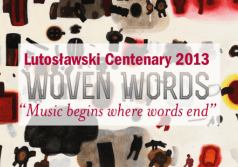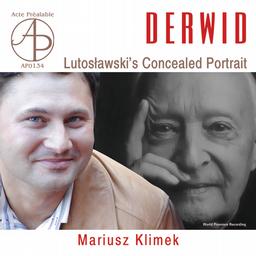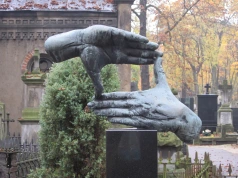 The Philharmonia’s Orchestra’s Woven Words celebration of the centenary of the birth of Witold Lutosławski has come to its end in London, although it is taking some of its repertoire abroad from time to time until September. It has been an undeniable success, with great performances of Lutosławski’s music under Esa-Pekka Salonen. I went to all three London concerts in the Royal Festival Hall, and the clear highlight for me was Krystian Zimerman’s superlative interpretation of the Piano Concerto in the first concert (30 January). Jennifer Koh brought an exceptional intensity and drive to Chain 2 in the final concert (21 March) and Truls Mørk’s performance of the Cello Concerto in the second concert (7 March) was also very fine. I wish I could be as enthusiastic about Mathias Goerne in Les espaces du sommeil, but his weak diction and exceedingly nervous manner were severe distractions. The programming of Debussy and Ravel was inspired, especially the placing of Ma mère l’oye at the start of the third concert. The performances of the French repertoire were, however, hit and miss: the complete Daphnis et Chlöe was riveting, La mer rather matter-of-fact, while La valse – the last piece in the series – went for absolutely nothing because of Salonen’s expression-denying, helter-skelter speed.
The Philharmonia’s Orchestra’s Woven Words celebration of the centenary of the birth of Witold Lutosławski has come to its end in London, although it is taking some of its repertoire abroad from time to time until September. It has been an undeniable success, with great performances of Lutosławski’s music under Esa-Pekka Salonen. I went to all three London concerts in the Royal Festival Hall, and the clear highlight for me was Krystian Zimerman’s superlative interpretation of the Piano Concerto in the first concert (30 January). Jennifer Koh brought an exceptional intensity and drive to Chain 2 in the final concert (21 March) and Truls Mørk’s performance of the Cello Concerto in the second concert (7 March) was also very fine. I wish I could be as enthusiastic about Mathias Goerne in Les espaces du sommeil, but his weak diction and exceedingly nervous manner were severe distractions. The programming of Debussy and Ravel was inspired, especially the placing of Ma mère l’oye at the start of the third concert. The performances of the French repertoire were, however, hit and miss: the complete Daphnis et Chlöe was riveting, La mer rather matter-of-fact, while La valse – the last piece in the series – went for absolutely nothing because of Salonen’s expression-denying, helter-skelter speed.
Less trumpeted were the complementary concerts. Students from the Royal College of Music played a sterling role in this regard, in concerts on 4, 6 and 27 February and on 6 March. There were also three events by young Polish musicians playing music of their contemporaries, though these events were barely evident in either the Philharmonia’s online publicity, which failed to keep up-to-date with some programme changes, or within the RFH signage itself. This was a pity, and something of a discourtesy to the Polish side of the partnership (the Adam Mickiewicz Institute), which had brought fresh imagination to these supporting recitals. (A full list of the Lutosławski and other Polish repertoire in the London concerts is given at the foot of this post.)
Kwartludium
The first supporting event in the RFH came before the second concert (7 March) and was given by the Polish ensemble Kwartludium (clarinet/bass clarinet, violin, percussion, piano). The advertised repertoire of music by Wojciech Blecharz (b.1981) and Jagoda Szmytka (b.1982) was replaced by pieces by other Polish composers: Sławomir Wojciechowski (b.1971), Wojciech Ziemowit Zych (b.1976) and Dariusz Przybylski (b.1984). Dagna Sadkowska and Piotr Nowicki began the recital with a performance of Lutosławski’s Subito, which the full ensemble followed with a ghostly ‘impression’ of the piece. All three of the other works had great dynamism and instrumental imagination. A fragment of Zych’s piece (in Polish: Stale obecna tęsknota) is available on the Kwartludium website: http://www.kwartludium.com/Zych.mp3. This recital was an extremely rare opportunity in this country to hear Polish music written since 2000, and that in itself should give us pause for thought. We are too wedded to the triumvirate of Lutosławski, Penderecki and Górecki. There are not only many other Polish composers born before 1945 who are totally neglected in the UK, but also four decades of composers who now range in age from their mid-60s to their mid-20s and whose names are barely known, let alone their music. Our concert repertoire – and not only with regard to Poland – remains more insular than we (are prepared to) recognise.
Cellotronicum and Cellonet
The second supporting event took place before the third concert (21 March). The first part was given by Cellotronikum, comprising the cellist Andrzej Bauer with computer input by the composer Cezary Duchnowski (b.1971). They gave the world premiere of For A.B. by Ryszard Osada (b.1972), followed by Duchnowski’s Broda. In the second part, given by the Cellonet ensemble, Bauer conducted eight of his own students in Penderecki’s own arrangement of his Agnus Dei and in Octagon by the Ukrainian composer Lubawa Sydorenko (b.1979). In both pieces, Cellonet was absolutely stunning, and you can hear the Sydorenko on the Cellonet MySpace site: http://www.myspace.com/cellonet/music/songs/lubawa-sydorenko-octagon-58524337. This was music-making of an unusual order, and it is a measure of its quality that two of the eight cellists – Bartosz Koziak and Marcin Zdunik – have won the Lutosławski Cello Competition (in 2001 and 2007 respectively). I heard Zdunik give an inspired performance of Lutosławski’s Grave in Warsaw in January and he told me after the RFH recital that he’s about to record the Lutosławski Cello Concerto, so that is definitely something to look out for.
El Derwid
The final supporting event, and the most neglected, came after the third Philharmonia concert and was held in the distinctly unsuitable Clore Ballroom (diabolical acoustics, nil atmosphere). It was a reworking of eight of over thirty dance songs that Lutosławski wrote in the late 1950s and early 60s under the pseudonym ‘Derwid’. For some unfathomable reason, the evening’s concert sheet failed to mention this rather crucial connection. I’ve known the Derwid songs in their original recordings for over twenty years, but even I was flummoxed by the unexplained heading ‘EL DERWID’. Had someone been reading Doctorow? Was there some unknown Venezuelan bandit connection? Subsequent research revealed that the ‘El’ comes from ‘Elettrovoce’, a duet comprising the composer and singer Agata Zubel (b.1978) and Duchnowski. Somebody might have thought to explain this. Zubel and Duchnowski (on piano as well as computer) teamed up several years ago with Bauer to perform their realisations of a selection of Derwid songs; a recording of this ‘El Derwid’ repertoire is due out on CD Accord this autumn.
Even though I caught only five of the songs (their performance must have started the minute the concert ended, as they were on song no.3 by the time I got downstairs), they were sufficient to whet my appetite for the CD. Zubel has great stage presence and a wonderfully flexible voice. In Czarownica (Witch), she and Bauer seemed to be having a domestic tit-for-tat, to humorous effect, while in Daleka podróż (Distant Journey) the trio brought a grating darkness to this tale of dreaming of distant, sunny climes. In this bitterly cold March weather, I knew how they felt. The title song for their set, Plamy na słońcu (Sunspots), delightfully and unexpectedly interlaced Derwid’s music with the Passacaglia theme from Lutosławski’s Concerto for Orchestra. Woven works. This fringe event brought a smile to the lips of those who had found it, and it gave the festival a properly fizzing conclusion.
Postscript
Two further aspects of Woven Words are worth mentioning. Firstly, and more importantly, the detail and skill that have gone into the woven-words.co.uk website. It is a model of its kind: launched well in advance of the festival (three months), it contains links to several specially commissioned films and a series of essays on Lutosławski. This is a very valuable resource, not just for the festival but for future readers and viewers. Secondly, there was a Lutosławski Study Day – ‘Lutosławski and the Interior Drama: The Spaces of Dream’ – held at the RFH on 16 March. There were five sessions: talks by Steven Stucky (‘Glimpsing an Ideal World’), myself (‘The Spaces of Dream: Lutosławski and Surrealism’) and Nicholas Reyland (‘The Sense of an Ending: Late Music, Enduring Concerns’), plus a workshop on the String Quartet with Steven Stucky and the Jubilee String Quartet, who then played the work complete. The day concluded with a panel discussion by the three speakers.
Woven Words: 20th- and 21st-Century Polish Repertoire
• Lutosławski/Philharmonia: Concerto for Orchestra (1954), Musique funèbre (1958), Cello Concerto (1970), Les espaces du sommeil (1975), Chain 2 (1985), Piano Concerto (1988), Symphony no.4 (1992)
• Lutosławski/RCM: Two Studies (1941), Bucolics (1952), Dance Preludes (1954), Jeux vénitiens (1961), String Quartet (1964), Epitaph (1979), Grave (1981), Mini-Overture (1982), Symphony no.3 (1983), Partita (1984), Fanfare for CUBE (1987), Subito (1992)
• Lutosławski/Kwartludium: Subito (1992)
• Lutosławski/Jubilee String Quartet: String Quartet (1964)
• ‘Derwid’/El Derwid: Cyrk jedzie (The Circus is Coming), Jeden przystanek dalej (One Stop Further), Z lat dziecinnych (From Childhood), Czarownica (Witch), Złote pantofelki (Golden Shoes), Daleka podróż (Distant Journey), W lunaparku (At the Funfair), Plamy na słońcu (Sunspots)
• Other
Cezary Duchnowski: Broda (2005)
Ryszard Osada: For A.B. (2013?) world premiere
Krzysztof Penderecki: Agnus Dei (1981), arr. eight cellos (2007)
Dariusz Przybylski: Medeas Träume (2008)
Sławomir Wojciechowski: Rope of Sands (2009)
Wojciech Zimowit Zych: Ever-Present Longing (2005)










